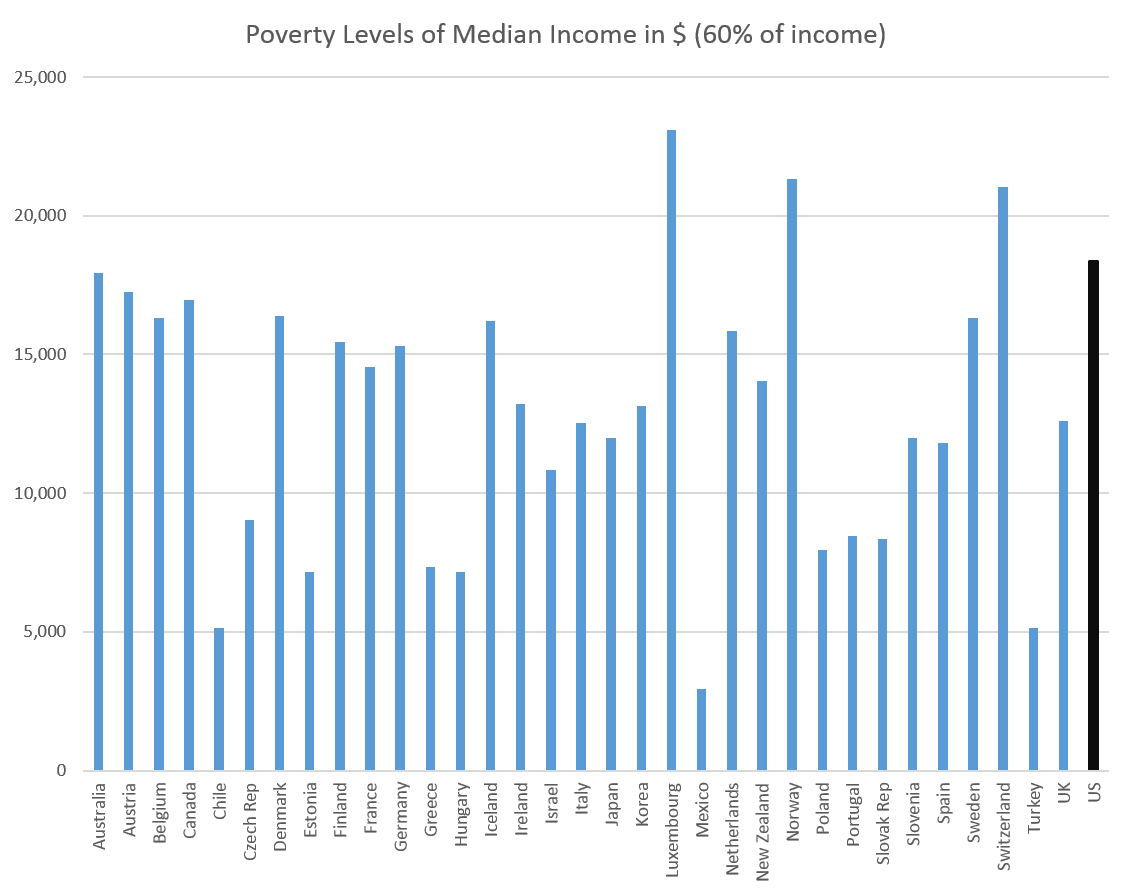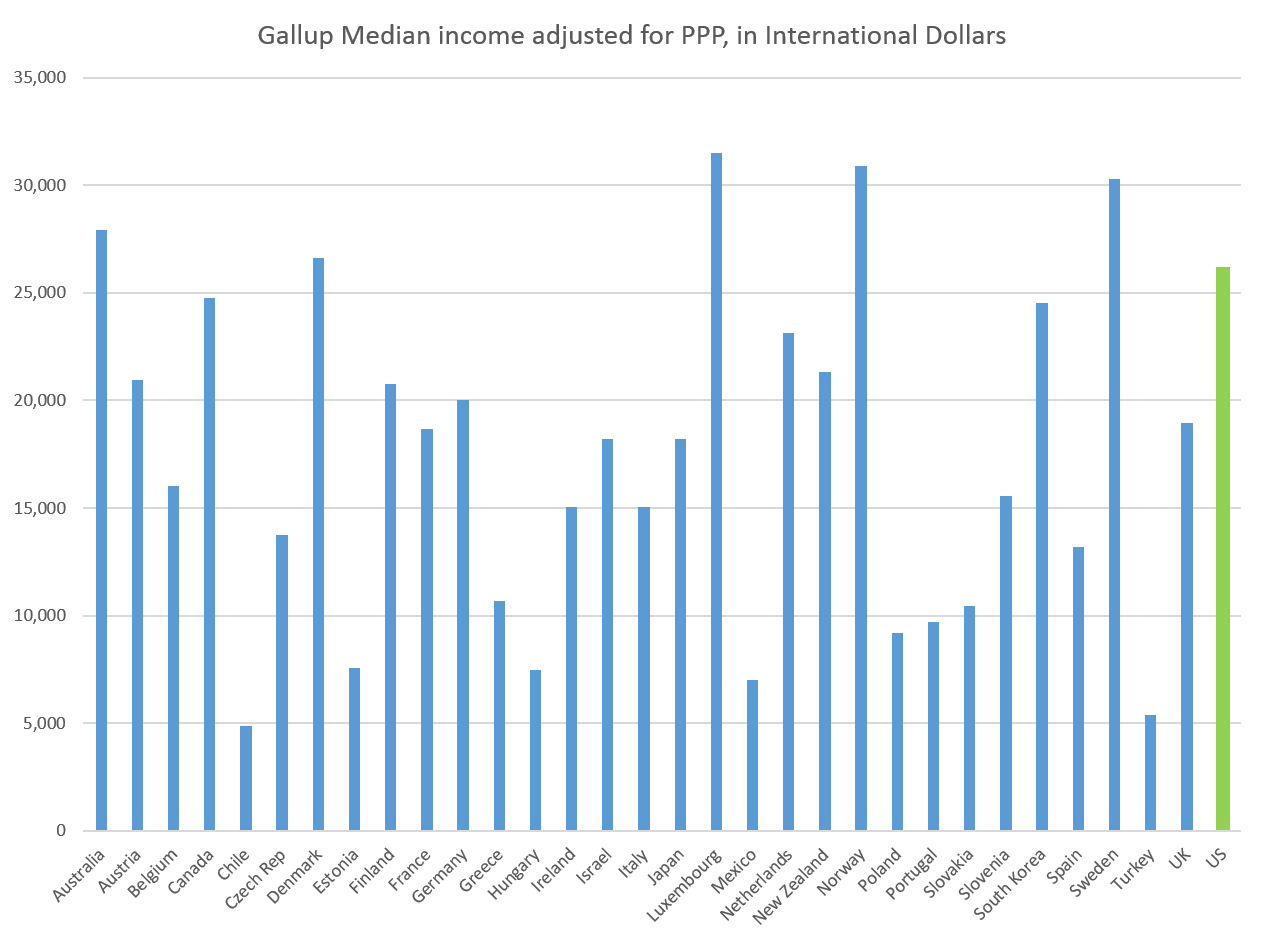ctk495 said:
sc94597 said:
ctk495 said:
I am taking a class on Anarchism at my school and have had heated discussions with my Professor who’s from the far left. While I lean more towards the libertarian side. The response he would say toward your points is 1) You provide anecdotal evidence “I never knew a single starving child in my life who lived in the U.S” just because you don’t see poverty doesn’t mean it doesn’t exist 2) You are White, therefore, your experience is very different from minorities (especially blacks) who would have a institutional racism working against them 3) You are an exception not the norm, as you said you had a “3.9 GPA” I doubt most poor people are that motivation or talented enough to accomplish that. 4) You are pursuing a STEM related degree which is hard and in an area that most people can’t succeed. Others who major in non-STEAM related fields probably work at Starbucks.
Your social mobility is more a reflection of your ability to have external factors working for you(race and neighborhood) and having great talents in areas were most people would fail( academics especially in STEAM fields that are in high demand.) Therefore, despite your poverty you are able to succeed not that most people can succeed within the system.
|
My response to him:
1.) The burden of proof is on the one who claims existence. There is no empirical evidence that starvation is a real thing in the United States. There are no children dieing of malnutrition, nor any hospitalized for malnutrition due to a lack of resources to purchase food on their parents part. Since my experience is in the subset of the population whom would have these issues and I posit that I have known more persons with incomes less than the poverty line than you will ever record or meet in your life, I think my experential knowledge trumps your presumed assumptions of whom comprises the American poor.
2.) Again, that is very presumptous of you, professor. While I am racially caucasian, my half-brothers are all multiracial, and my mother has dated black men since I was a child. The majority of her friends were not white. Furthermore, I am not ethnically WASP, as my father qualifies as hispanic, and I don't look ethnically WASP or what an American would call as "White." My surname is also a spanish surname. So I am subjected to these same institutional racisms that you are attributing to non-caucasian hispanics.
3.) Then you underestimate the poor, and must get to know the people you are defending. They are not helpless and without ability. They have plenty of talents and motivation. Their parents might have not had talent nor motivation, arguably, but the children are not the parents. Isn't it a common theme on the political left that the poor would succeed if they had resources, and it isn't necessarily that they are dumber or less-motivated than other groups? I agree. I might disagree on how we (poor persons) should obtain those resources, but I do agree that the lack of good resources is a limiting factor.
4.) That isn't an excuse. STEM degress are in demand for a reason, and that demand is being filled by foreign persons from much rougher situations and fewer resources than the impoverished Americans have: people whose families recently rose from poverty in China, India, and other Asian countries. If somebody chose to go into a humanity, knowing very well that this will affect their chances of finding a job because of oversaturation, then that is a choice they were responsible for and they must feel the consequences. If they just applied a little bit more work then they could achieve in a STEM field or a technical humanity (economics, statistics, experimental psychology, etc.)
So professor, I ask you, why do you underestimate the natural ability of human beings to achieve, learn, and create? It seems to me that you have a very insulting and classist view on who comprises the American poor. I am not that pessimistic. I believe while there are more obstacles for the poor (if we are to generalize), they can achieve quite a bit if they wish to. In this whole discussion you seem to mention things that only these individuals can change, such as being capable or motivated of achieving STEM degrees. You never mentioned that the poor can't succeed because they are too hungry, or they don't have enough resources to take the prerequisite exams. if the issue is a cultural one, and not an economic one (as I noted the poorer Chinese, Koreans, and Indians succeed in STEM field), then how would you propose we motivate these cultures to pursue STEM degrees?
Additionally professor, what is the American system missing that can help the poor? Was that not my original inquiry? Other than food, shelter, health care, education funding, and so on what else can be done for the poor?
|
I’ll try to emulate my Professor. I am sure that when I show him this post he will refer me to some statistics, in order to make these points stronger. I want to improve my debating skills so I thought I should answer myself without his help.
1 We are talking about the upmost poor in America. I recommend this documentary:http://www.foodchainsfilm.comI will have to fact check on starvation. But other than that, again your ‘experiential knowledge’ does not qualify you to make any conclusions. In fact you lived “pretty nice middle class small city.” Which further disqualifies you from suggesting that your experience can accurately reflect those that suffer the consequences of poverty.
2. Black and non-English speaking Hispanics will suffer many more difficulties, kids whose parents are non-english speakers/1st generation Americans. You are very much Americanized, by the fact that you went to a public school and learned to speak Standard English (unlike African American vernacular or other dialects.) These people can’t get jobs due to prejudices against those dialects.
3) You are still basing yourself on your subjective experience you can’t answer on behalf of the poor if in your specific community people were motivated and talented. Only statistical evidence can provide an accurate reflection on how most poor people think and feel.
4You are basing yourself in a new sample, yet you are not seeing that the same rules apply, how many Chinese/Asian/Indians end up in Foxxcon or a big corporation that exploits them as opposed to the rare genius who can come to America due to his talent? Say that 1 for every 100. Then for every 10, 1000 will stay in poverty. All the foreigners that ‘make it’ are exceptions. Also you display a lack of compassion for people who are pursuing their passions “they must feel the consequences.” This means 4.1) Capitalism has turned your mindset into one that favors profit over people. 4.2) Capitalism is less free than other systems because you can’t pursue what you like but what makes money.
So student, it is not that I am underestimating the poor but rather that you rely on personal experiences, generalizations and seeing details and not the complete picture. You scrape by poverty since you capitalized on factors working for you (speaking SAE, going to school, passing as white-I doubt that having a Spanish last name made you a target for racial profiling) therefore, you don’t see who compromises the American poor (illegal immigrants, blacks, disenfranchised minorities) or who compromises the ‘foreigners’ (rare exceptions within the hordes of people) you talk about. I agree that they have other obstacles-hunger, lack of resources that undermine then.
American culture is much more creative than those other cultures. Those cultures you speak about work in a process of elimination where too much value is placed on STEM and everyone who fails is left behind. Just take a look at the hikikomori phenomenon in Japan. What can be done for the poor? Affirmative action, integrating new dialects in school, stopping racial profiling (which leaves black families broken.)
|































































